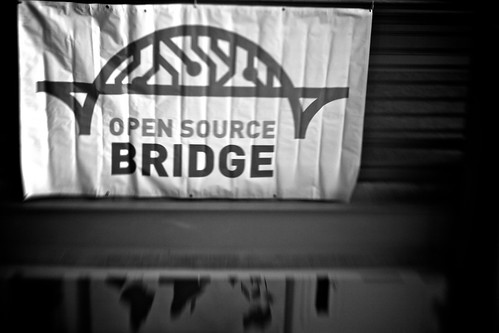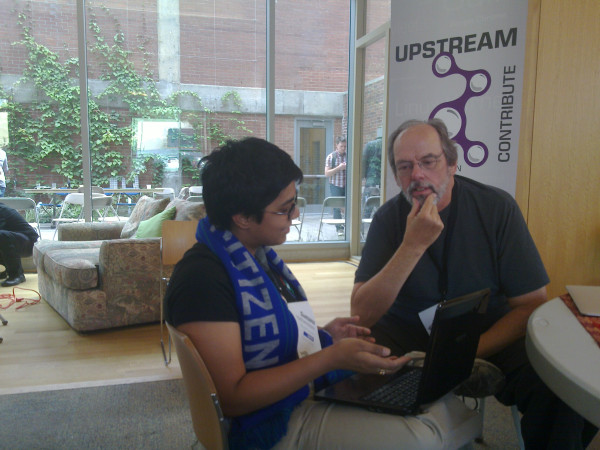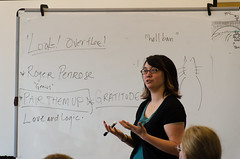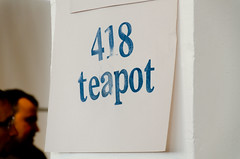Blog by Sumana Harihareswara, Changeset founder
Open Source Bridge 2011
Hi, reader. I wrote this in 2011 and it's now more than five years old. So it may be very out of date; the world, and I, have changed a lot since I wrote it! I'm keeping this up for historical archive purposes, but the me of today may 100% disagree with what I said then. I rarely edit posts after publishing them, but if I do, I usually leave a note in italics to mark the edit and the reason. If this post is particularly offensive or breaches someone's privacy, please contact me.

I had a wonderful time at this year's Open Source Bridge conference. Last year at OSBridge, I presented "The Second Step: HOWTO encourage open source work at for-profits" and had a great time. So this year I spoke on technology management, with the fairly ambitious title "Learn Tech Management in 45 Minutes". Addie Beseda reported such a high turnout that people were standing in the hall outside the door listening to the talk, which blows my mind. Audio and polished notes coming soon; slides & nearly complete notes available now.
 Because we released MediaWiki 1.17.0 (after 11 months of development and review!) while I was in Portland, I also led an unconference session on "What's new in MediaWiki 1.17 and How You Can Help". People volunteered to help us with PostgreSQL support, testing, design ideas, bug triage, the parser, and more. And I got to talk about the new release with Ward Cunningham, who invented the wiki. That has got to be a Sumana career highlight.
Because we released MediaWiki 1.17.0 (after 11 months of development and review!) while I was in Portland, I also led an unconference session on "What's new in MediaWiki 1.17 and How You Can Help". People volunteered to help us with PostgreSQL support, testing, design ideas, bug triage, the parser, and more. And I got to talk about the new release with Ward Cunningham, who invented the wiki. That has got to be a Sumana career highlight.
I also performed some geeky stand-up comedy, and people liked that. So that's nice.
Sessions I attended:
- DNSSEC @ Mozilla -- way over my head, which is fine.
- A Dozen Databases in 45 Minutes -- I found this very useful in helping me understand, among other things, why one would privilege availability over consistency. Thanks to speaker Eric Redmond for some memorable metaphors.
- Drupal Distributions, an Open Source Product Model made me think about the danger of fragmenting sub-communities within a larger FLOSS community.
- The open source communities panel -- I did not pay enough attention to this, as I was finishing up work on my talk. I do remember some people disagreeing about qualitative versus quantitative release management decisions and about how to recruit and mentor new participants; sadly I don't have any useful recollections.
 Selena Deckelmann led "How to Ask for Money", which I think many people will find useful. Some of their lessons: "Find a fundraising mentor," "Hire a graphic designer", "Your network is bigger than you think," "Ask again anyway," and "Do what you say you'll do. And if you don't, communicate why - now."
Selena Deckelmann led "How to Ask for Money", which I think many people will find useful. Some of their lessons: "Find a fundraising mentor," "Hire a graphic designer", "Your network is bigger than you think," "Ask again anyway," and "Do what you say you'll do. And if you don't, communicate why - now."
- Dawn Foster's fantastic "Online Community Metrics: Tips and Techniques for Measuring Participation" was -- to all the community managers in the room -- worth the price of admission on its own. Hit the slides (per her blog post) for great pointers to MeeGo's statistics, MLStats for mailing list analysis, irssistats for IRC analysis, and more. And I have some additional notes at the talk's OSB wiki page.
- The Birds of a Feather session for Google Summer of Code proved educational; students, alumni, mentors, projects' administrators, and Google's GSoC administrators discussed challenges and opportunities. I learned that GSoC organizational administrators can email Carol Smith at Google to request possible travel stipends for their GSoC students to attend conferences, and possibly to look at previous mentors' evaluations to decide whether to keep them another year. Also, FLOSS projects report great success with the tactic of requiring applicants to do small tasks to prove they're serious and to set up those students to succeed, and mentors and org admins did not seem to think that this would unfairly weight admissions towards students who were already going to go into open source anyway.
 "Snooze, the Totally RESTful Language": hilarious, because Markus Roberts led it. My dents from the session:
"Snooze, the Totally RESTful Language": hilarious, because Markus Roberts led it. My dents from the session:
- # In Markus Roberts's #osb11 talk "Snooze, the Totally RESTful Language". Leonard, you never told me REST was a meaningless acronym. BETRAYAL
- # Demo fail. "Anyone here have a laptop?" "What, you want me to go to localhost *for* you?" #osb11
- # "I think there's a market for this, especially if we convince people that there is one." ... "Are you incepting?" #osb11
- # Markus is now just riffing on soaking up consumer surplus, Bitcoin, NoSQL, pig Latin, & the joy of boundaries. #osb11
- Elizabeth Naramore spoke on technical debt (slides). One item that really struck me is her experience that sometimes chipping away at little tech debts won't get you the momentum & buy-in you need. You need a big thought-provoking goal.
- "Inviting Contributors to Open Source Webdev through Virtualization" by Les Orchard told me that not just Dreamwidth, not just Wikimedia, but also Bugzilla and addons.mozilla.org are trying this concept. Four makes a trend! I hope they all compare notes. I also learned of a tool to sanitize real data dumps, to get useful test databases that community developers can use.
In between, I saw new friends and old, talked up MediaWiki, told people about the zillion open positions for which Wikimedia Foundation is hiring, played Dance Dance Revolution, ate great food, and enjoyed the inimitable atmosphere of a great conference.
A few ego-stroking notes: Open Source Bridge's Melissa Chavez also interviewed me for an eight-minute video. And, with Asheesh Laroia and Igal Koshevoy, I was named one of three Open Source Citizens by the conference organizers. Thank you for the honor; I will wear my scarf with pride!
(Thanks to the Wikimedia Foundation for the plane flight, to the conference for letting me in free as a speaker, and to my friends Brendan and Kara for hosting me. Thanks to Reid Beels and John Parker for their photos, which are CC BY-NC-SA. Thanks also to Josh Triplett for his photo.)
Comments
Josh Triplett
http://joshtriplett.org/
30 Jun 2011, 3:46 a.m.
Camille
http://wheelville.blogspot.com
30 Jun 2011, 8:02 a.m.
I am glad to hear it went so incredibly well! I look forward to hearing even more about it when I (hopefully) see you soon!<br/>C

Glad you liked the photo!
Your post made me realize that I didn't actually put any kind of license on that photo. Please feel free to use it under CC BY-SA. (Know any good photo-hosting sites similar to twitpic that support license metadata, so I can just check a box to freely license photos I share?)